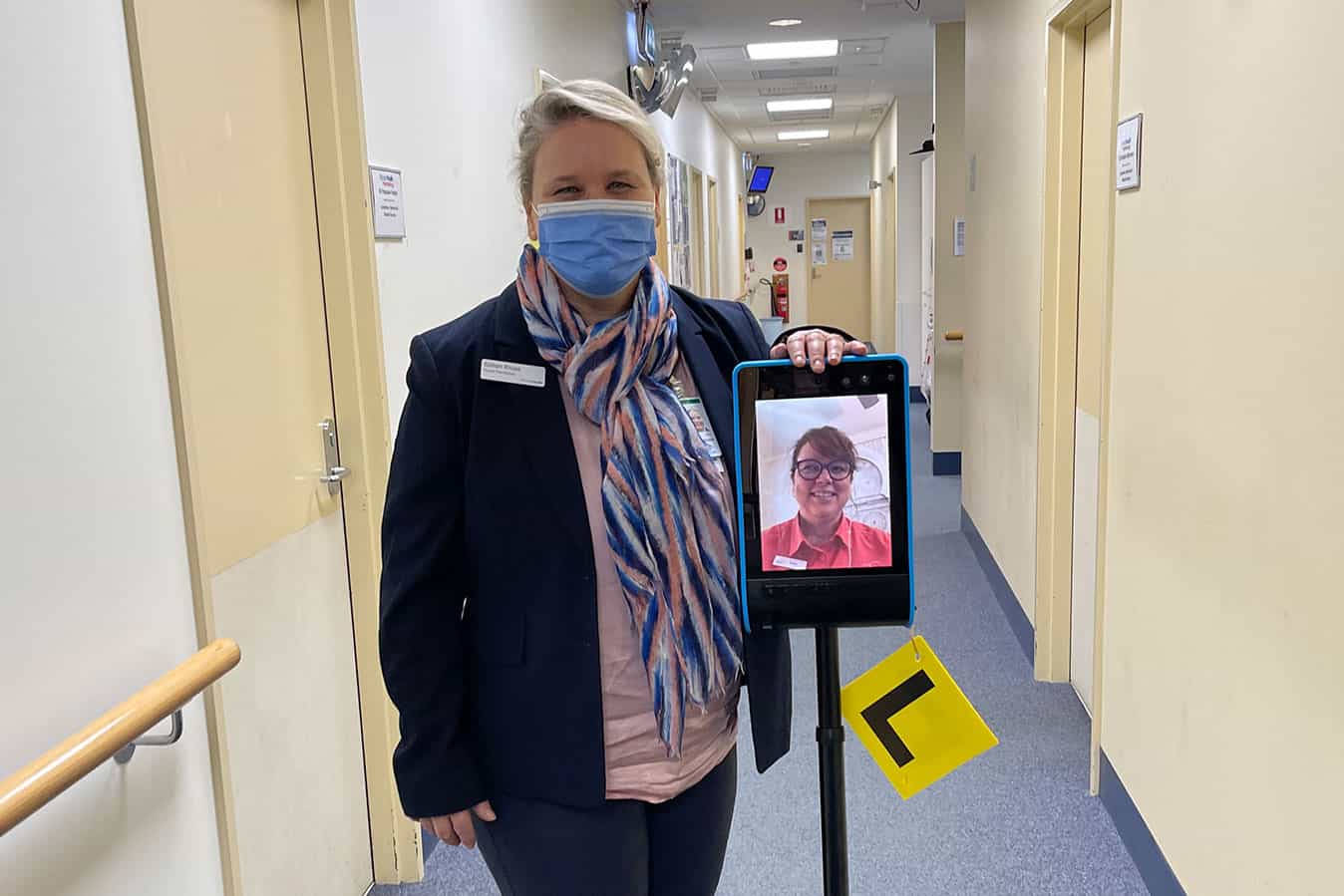Meet ‘Rosie’, the telepresence robot allowing breast cancer nurses to undertake vital training from anywhere in Australia during COVID-19.
The pilot program, delivered by the McGrath Foundation, Monash Health, Monash University and Southern Melbourne Integrated Cancer Services (SMICS), was designed to upskill and empower McGrath Breast Care Nurses who care for people with metastatic breast cancer.
The telepresence robot allows nurses to take part in the training program at the Monash Health Campus at Moorabbin Hospital in Melbourne’s south-east from anywhere in Australia. Amid the uncertainty of ongoing border closures and restrictions, it has allowed nurses taking part in the course remote access to clinical areas of the hospital to gain crucial practical experience.
Monash Health metastatic breast cancer nurse practitioner Gillian Kruss said the idea for the breast cancer nurse training program, which will see eight nurses take part in the first year, was developed about five years ago.
The program includes pre-reading and online modules tailored to the individual learning needs of each nurse followed by a three-day practical component delivered via the robot. Across the three days, the nurse undertaking the training shadows the metastatic breast cancer nurse practitioner at the hospital, including attending team meetings, outpatient clinics, and supportive care consultations with patients. Nurses are then supported with a year’s worth of bi-monthly clinical supervision.
“When COVID-19 occurred, restrictions prevented nurses from crossing borders and entering Monash Health to participate in the practical component of the training program,” Gillian explains.
“We tossed up ideas about using go-pros and virtual reality glasses, but we quickly realised that what we needed was a robot to move around the hospital with nurses “beaming in” to attend, observe and learn in these clinical areas remotely and safely.”
Enter ‘Rosie’, the telepresence robot.
“The robot looks a bit like an iPad on a Segway and is controlled remotely by the participating nurse,” Gillian says.
“Like any new technology, we’ve had to learn to use it and have done some testing and troubleshooting to ensure it’s a good experience for the nurse ‘driving’ the robot while they do their training. We also train the participating nurses on how to drive the robot remotely before they attend the practical component of the training program, so they feel comfortable operating it and learning at the same time.”
Gillian says nurses who have taken part in the training have found it easy to operate remotely using either their iPad or phone and have reported that it still feels like they are actually physically present in the clinical areas via the robot despite them actually being in another state.
The nurse undertaking the training is on the screen and has a 180-degree view of the clinical area and can hear and speak to instructors as if they were there in person.
McGrath Metastatic Breast Clinical Nurse Consultant Katie Head, who works at the Mater Hospital in Brisbane, was one of the first nurses to undertake the training remotely.

“Due to the COVID-19 restrictions I was unable to travel to Melbourne to undertake the training in person,” she says.
“Although I was disappointed to not be able to attend in person the opportunity to participate via telepresence robot was amazing so that I didn’t have to miss out on the program completely.”
What was the experience like?
“Prior to commencing the training program, I had robot orientation with ‘Rosie’ and the program coordinators Olivia and Gill. This involved downloading an app that allowed me to drive Rosie via my iPad. This was immensely beneficial so that I could learn how to navigate and get the feel of driving Rosie. Over time, I actually forgot that I was participating via a telepresence robot and actually made me feel that I was there at Monash Hospital – Moorabbin campus.”
Sitting on the other side of the screen at Monash Hospital instructing Katie was Gillian Kruss.
“The robot has been well received by the staff, patients and visitors and it is now becoming a familiar sight around the hospital,” she says.
“Most people who encounter the robot are fascinated with it and many stop to interact and have a chat with the nurse who is “in” the robot. The reaction of the people around the hospital is fun to see.”
Katie says the biggest challenge of the program was unforeseen – NBN updates in her area that hampered her internet connection on day three.
As for the benefits, she describes the course as a great way to upskill and enhance understanding of the complex needs of metastatic breast cancer patients.
“It allowed me to participate in clinics seeing patients with Gill as an onlooker, allowing me to learn advanced skills in assessment, communication and treatment options.”
“I feel the program will allow me to provide improved evidence-based patient focused care. It has improved my understanding of the physiology of metastatic breast cancer, the treatments available and best practice, as well as providing me with a wider lens to care holistically for patients and address psychosocial needs.”
According to the Australian Institute of Health and Welfare (AIHW), breast cancer is the most commonly diagnosed cancer in Australia with one in seven women diagnosed before the age of 85.
The McGrath Foundation funds McGrath Breast Care Nurses who support people experiencing breast cancer across Australia. Of the 171 current nurses, 24 are dedicated Metastatic McGrath Breast Care Nurses, who care for people with incurable breast cancer. Nurses provide essential physical and emotional support free to anyone experiencing breast cancer and their families from diagnosis to treatment.
“The needs of those diagnosed with metastatic breast cancer differ to those with early-stage breast cancer, with the focus of treatment on prolonging life and ensuring the quality of life is maximised,” McGrath Foundation Chief Nursing Program Officer, Jane Mahony says.
“These patients and their families have more complex supportive care needs, so it is vital our nurses have the skills and knowledge to support them.”
Staff from Monash University and Southern Melbourne Integrated Cancer Services (SMICS) will evaluate the pilot project.
“If the results demonstrate that the experience of everyone’s use of and interaction with the robot is equivalent to having a nurse physically present in the clinical areas for learning, it will likely be supported as an ongoing inclusion in the training program for breast care nurses across the country,” Gillian suggests.
“The use of the robot could form part of the McGrath Foundation’s ongoing professional development program that includes a mixture of online, face to face, practical and theoretical training. It would be particularly beneficial for nurses who must travel long distances to attend in person training.”
But despite the benefits of innovation, Gillian is quick to point out that ‘Rosie’ the robot is not replacing nurses.
“It is however ensuring the participating nurses are able to access this vital training safely during ongoing uncertainly of lockdowns and border closures. This has a flow on effect; upskilling our nurses ensures that those with metastatic breast cancer are not missing out on improved supportive care as a result.”
To find out more visit The McGrath Foundation








